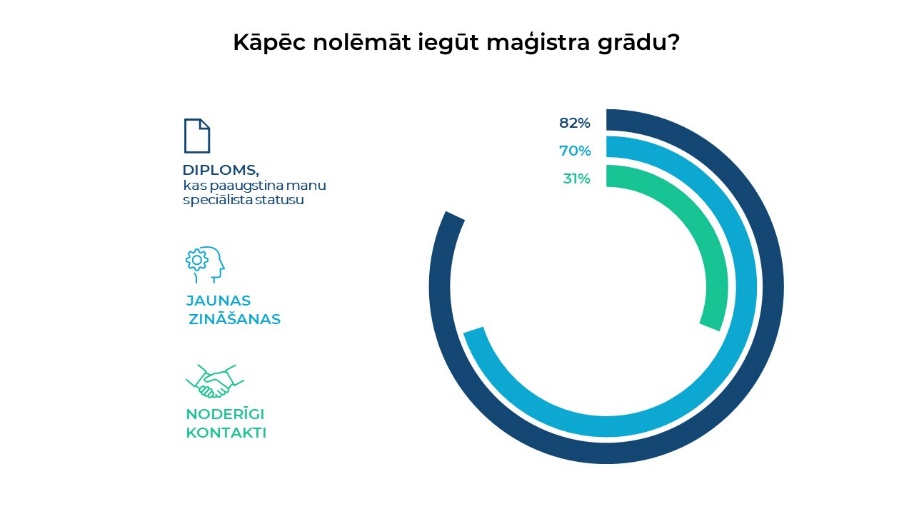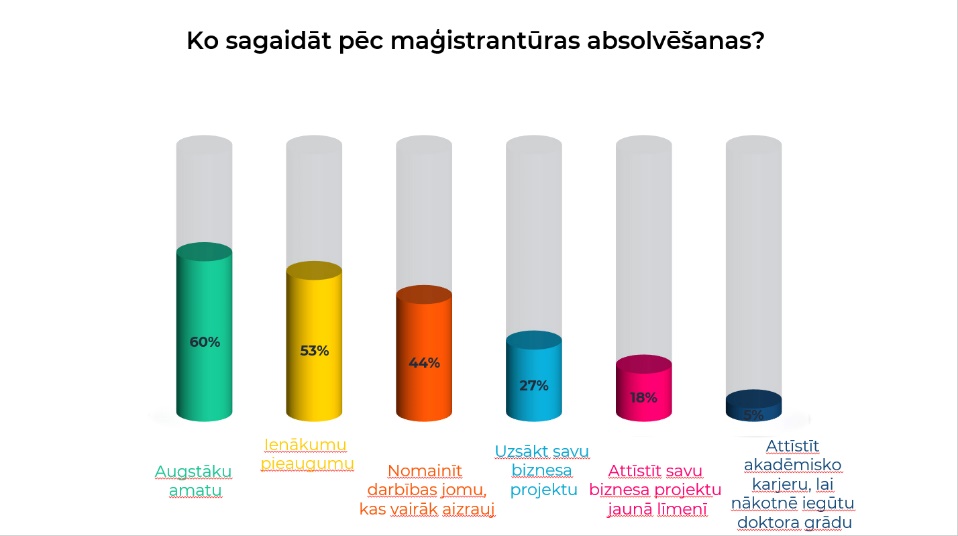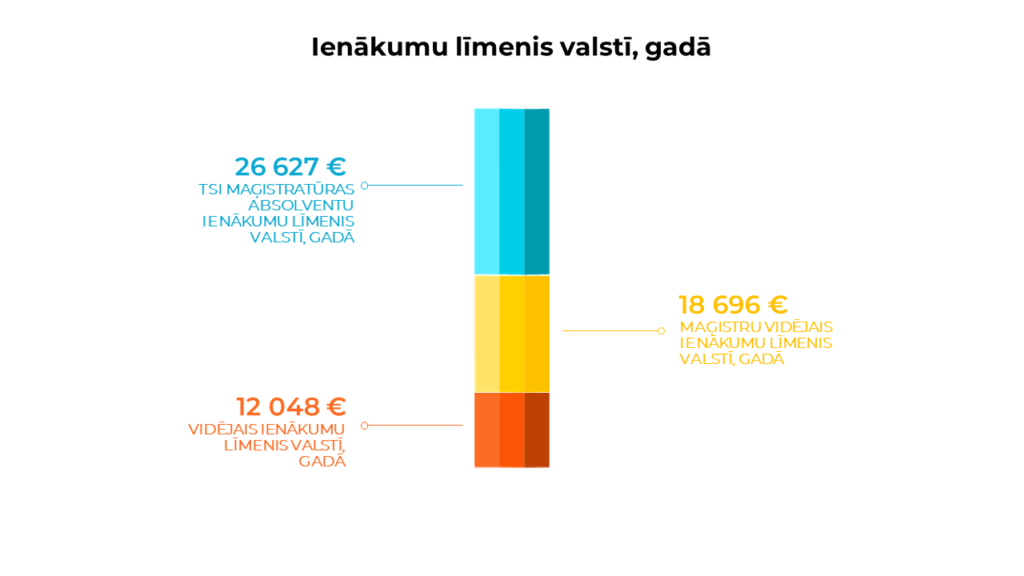A survey of master’s level students by the Transport and Telecommunication Institute (TSI) shows that students hope to hold higher positions and earn more after graduation. Research data shows that their wishes will come true. Latvian and foreign studies confirm the tendency that investments in master’s degrees pay off. Is it time for you to upgrade your education level and improve your career prospects?
At the end of last year, TSI conducted an anonymous survey of master’s level students to find out the reasons why our students choose to study for a master’s degree, their expectations regarding obtaining a master’s degree, as well as the most important benefits they already feel during their studies. The results of the survey show that the main reason is “to obtain a diploma that increases the status of a specialist” – this option was noted by the absolute majority or 82% of respondents. Gaining new knowledge was important for more than two-thirds (70%) of the respondents (respondents could choose several answer options). Almost a third (31%) highly value the opportunity to get useful contacts.

After graduation, the majority expect a higher position (60%) and an increase in income (53%). Almost half (44%) of students hope to change their field of activity to the one that excites them more after receiving the diploma. Some of the respondent’s hopes are related to business: 27% want to start their business project and 18% want to develop their business to a new level. Some respondents hoped to develop an academic career and indicated that a master’s degree was necessary to obtain a PhD in the future. The knowledge that students have already acquired during their studies will be discussed further in the article. In the meantime, let’s take a look at the data on graduate income and employment.

Who earns 121% more than the average employee in Latvia?
Last year, The Foundation for Research on Equal Opportunity published the results of a major study based on data from 14,000 masters and PhD programs in the United States. The majority of students noted that they choose advanced studies to develop their careers. So, TSI graduate students are no different from their US coequals in this regard. The authors of the study calculated ROI, or Return on Investment, as the increase in lifetime income after obtaining a degree, minus the cost of study. One of the rather shocking results of the study was that 40% of master’s degrees in the US do not pay off at all. It’s a completely different picture for master’s degrees in the field of computer science and engineering, with an average ROI of more than half a million dollars.
This year, the Ministry of Education and Science of the Republic of Latvia (IZM) published its data compilation, from which it was concluded that “a higher level of education means higher employment in higher qualification professions and higher incomes”. Experts of the Ministry noted that, unlike undergraduate graduates who are at the beginning of their careers, graduates of master’s and PhD degrees are typically already at a different age and career stage. However, the correlation between education level and income level was confirmed.
Among them, the research examined the income of master’s prepared by Latvian universities one year after graduation. It turned out that TSI master’s graduates are in the second place among all higher education institutions (both public and private) in Latvia in terms of income. The average income level in the country during the research period was 12,048 euros per year. In the same period, the average income level of masters was 18,696 euros, so it was 55% higher than the average in the country. On the other hand, TSI master’s earned an average of 26,627 euros during this period, which is 121% higher than the average income in Latvia. One year after graduation, 96% of TSI master’s graduates were employed. In general, this ratio for masters is also quite high in the country – 91%.

The Latvian study reflects the same trend regarding the importance of the field of study as the US study: engineering masters can earn much more than the average salary in the country.
Masters make up less than a third – 27.8% – of all graduates in Latvia. “As a country, we have too many undergraduate students and only a few master and PhD students. This is a very important aspect for Latvia’s competitiveness at the European level”, says Igors Rodins, partner of Deloitte Central Europe, academic advisor of the development of artificial intelligence (AI) at TSI, as well as one of the strategic cooperation partners of TSI’s double degree master’s study program “Computer Science: Data Analytics and Artificial Intelligence“.
Furthermore, master’s degrees in STEM fields are in the greatest demand. The authors of the IZM study note that there is a discrepancy between the structure of graduates and the requirements of the labor market. Namely, there is an overproduction of social science graduates and an insufficient number of engineering, natural sciences, and IT specialists. It should also be mentioned that more and more social science graduates are retraining and building careers in the fields where there is a higher demand for the labor force.

What exactly does a master’s degree provide?
Nowadays, there is no shortage of opportunities to acquire additional professional knowledge and skills in a wide variety of courses, both in Latvia and abroad, both in person and online. It could also have a significant impact on your career or business development. Why should you choose master’s studies? “Critically speaking, advanced training courses are a good thing if you want to quickly learn practical knowledge and acquire practical skills in a specific field or work with specific software. On the other hand, studies at the master’s level provide both practical skills and the necessary theoretical basis. In addition, it also develops critical thinking and provides opportunities for networking with fellow students through joint activities”, answers TSI vice-rector for academic and research, professor Mihails Savrasovs.
Another alternative to obtaining a master’s degree is professional retraining, which provides an opportunity to learn a new profession with an existing higher education. This trend is also observed by the TSI team. In the double degree master’s program “Computer Science: Data Analytics and Artificial Intelligence“, the university accepts students without IT education, providing students with intensive study courses (pre-master) in programming and databases. As one of the options that TSI offers, it is taking additional courses on the online learning platform “Coursera”, so that students have the opportunity to successfully learn the basic study program.
The TSI master’s student’s answer to the question “What was the most valuable thing you already gained during your master’s studies?” confirms in general the same thing that Professor Savrasovs is talking about. In addition to new knowledge and skills that have already helped to improve daily work, students value everything related to communication. Communication, new contacts, and exchange of experience with fellow students, colleagues from one’s industry, with lecturers (many of whom are practitioners and occupy leading positions in prominent companies), as well as intercultural communication, as both local and foreign students study in the master’s program, proved to be valuable. Among other answers that were offered in free form, students have recorded an understanding of processes, a better understanding of the industrial environment, and interesting laboratory work. Some people noted that developing their learning skills was something they valued because “challenges and learning never stop” and “knowledge needs to be constantly improved, challenged and expanded, otherwise it stagnates”. Some respondents honestly stated that master’s studies made them practice patience and learn to balance studies with work and free time.
” What we have gained from the discussions is invaluable. You can’t read it in any book, what is the real experience of everyone working in different types of airlines “, underlines the importance of networking, Anda Sivina, alumna of the TSI master’s program “Aviation Management“. Here is what Aleksandra Karnakova, alumna of the master’s program “Computer Science“, IT solution technology architect at the company “Outokumpu Group Oyj” (Helsinki, Finland) says about her benefits: “In just two years I gained a lot to proceed with the international working experience and I felt extremely confident in being competitive also outside of my home country. Synergy of theoretical knowledge and work experience helped me to deliver dozens of data migration and software projects, participate in global implementation programs with more than hundreds of team members across the globe”.
Let’s also note that in some fields and specialties, employers prefer candidates with a master’s degree, so such a diploma makes you more competitive in the labor market.
Go towards new knowledge, contacts, and perspectives! www.tsi.lv
